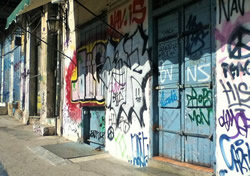Hypno's Cave
by Scott Thomas Anderson
in Sacramento News & Review

Looking down at St. Catherine Church
from a balcony at Hotel Phaedra in Athens.
"Hypnosis” is a Greek word inspired by a god who dwelled in a dark cave the sun could never penetrate. This lonesome fate is actually being replayed all around us, thought I wasn’t fully aware of it until a recent trip to Greece.
Consider Athens: With its fast-fingered drifters and smiling port hustlers, its 28-percent unemployment rate, its paperless sewer system that barely works and more public graffiti than private windows, it’s easy to see why some view Athens as the Tijuana of western Europe. In fact, austerity demands are so bad in the land of Sappho and Sophocles that a number of Greeks who’ve been laid-off are continuing to show up to work for free. But if today’s Greeks are poor in currency, they’re rich in spirit; and could be more obvious when holding up Athens’s bustling cafe culture to the urban-chic, third wave coffee hubs of a city like Sacramento.
Walking into an Athenian cafe, you’re greeted by the sight of friends and strangers engaging in animated conversations while openly and unapologetically people-watching. If a Greek coffee-lover isn’t interspersing cappuccino with gossip or raucous debate, then they’re absorbed in a newspaper or book, the contents of which anyone is free to comment on. Greek cafes are sonorous, lively centrifuges of human connectedness.
While Sacramento’s artisan espresso houses brim with atmosphere, they’re largely peopled by customers behaving like silent automatons—their faces locked blankly onto phones, tablets and laptops. Few, if any, speak to anyone around them.
They sip coffee in isolation, hardwired to the net. I’m as guilty of this behavior as anyone, but I’m also bothered that such inventive spaces are often relegated to soundless vaults. And at least some of the personalities building Sacramento’s coffee scene share this concern: When a new cafe opened in East Sacramento, it posted a sign that read: “No wifi Zone—conversation encouraged!” The idea of an indie coffeehouse without wifi is unthinkable; and yet that sign remains intact.
On a recent winter Sunday, I strolled into that café to see how the bold decision was playing out. Its tables were all packed with people enjoying kinetic, genuine dialogue. It was loud. It was energized. For a moment I felt like I was in Greece again, until I realized I’d stepped through a portal to a Sacramento that thrived just a decade ago, before we fell in love with an ever-connected, tech-social mode of face-to-face detachment.

Athens has quiet avenues at the height of
its economic collapse.
The omen crows have been circling for a while. I first noticed them in 2008, when a 46-year-old train engineer in Los Angeles was playing a game of thumb-hockey on his cell phone as he shot a text message to his friend. Seconds later, the Metrolink train he was operating collided head-on with Union Pacific freight locomotive, exploding into a tornado of steel that killed 25 people and left 40 more seriously injured. That was the same year a presidential campaign pitting John McCain against Barack Obama was highlighted by commercials attacking McCain for not being overly computer literate, mocking the war hero and lifelong public servant because he wasn’t good at texting. While the ads were right about the old pilot being out of touch, written into them was a more disturbing reality of Americans perceive the world.
It doesn't take a prophet to look around and realize people are being swallowed by a bottomless hole of technological illusions — a blinking universe of instant feedback that's rendering its victims genuinely horrified to be alone with their own thoughts. Americans may no longer be comfortable socializing on a human-to-human level in cafes, but many are equally panicked by the idea of not having online “followers” or "friends."
It’s now a landscape where people will avoid chatting with the person next to them while in the same instant desperately seeking affirmation from ghosts inside a circuit board: They rush to build digital tribes; they struggle to gather personality convoys; they pray to find disjointed grids where people can have meaningful relationships by posting grammatically sloppy sentences to one another.
Just a few sips from this wire-driven, mind-melting pot can spawn a fierce addiction in people. It can leave them dependent on a viral orgy of shared experience. There's no longer a need for self-examination. There are no more black hours of the night where only personal demons will chat with you. The gleaming carnival of static and self-affirmation is always there; just tap a screen and gorge yourself on virtual human contact. And as you look into the monitor's empty mirror, the little tweaks and imperfections that create a unique reflection begin to vanish. The comments and categories start running over each other. The profiles all look the same.
In the 1932 film, "The Bride of Frankenstein," tormented director James Whale offered a glimpse into his own hell in a scene where a blind man tells Frankenstein's monster, "Before you came, I was alone. It is bad to be alone." The monster — in all of Boris Karloff's growling, silver screen brilliance — replies, "Alone bad. Friend, good!" Maybe this is a timeless lament. But is it always “bad” to be alone?
John McCain found himself alone in a Vietnamese prison camp where he was threatened, tortured and dragged through the most excruciating gutters of his own physical and psychic purgatory. As he puts it, he was shown his breakpoint. He learned what he loved. He was humbled. The result was a lifetime of service to others.

Outside of Athens' Plaka and Agora
neighborhoods, the look gets less classic.
While most of us will never experience the kind of world-altering isolation McCain faced at the hands of the Viet Cong, the miracles of technology are causing even the simplest forms of isolation to be alien. Devices and social networks may encourage us to ignore the people at the next table, but they tempt us to race to another end, gradually replacing silent walks in the park, meditative drives at night, shadowboxing or even reading a good book. They insulate us in a streaming paradox of voices and connections. They allow us to create our own personal techno-hives where listening to a vague, collective drone is far more soothing than the alternative of our own true selves.
At the dawn of modern science, the poet Percy Shelley warned, "And Man, having enslaved the elements, remains himself a slave." Perhaps this was unavoidable. But even a slave casts a true shadow, and has a true reflection. As today's Americans grow more dependent on the buzzing cacophony of super links, they're in danger of losing far more than the ability to talk to fellow citizens in cafes, or having the concentration it takes to prevent a train from derailing, they’re giving up on two essential components of the human story — living in the moment through flesh-and-blood comradery, while having the unbreakable willpower and fierce determination that only comes from gazing into the mind’s darkest midnight.
